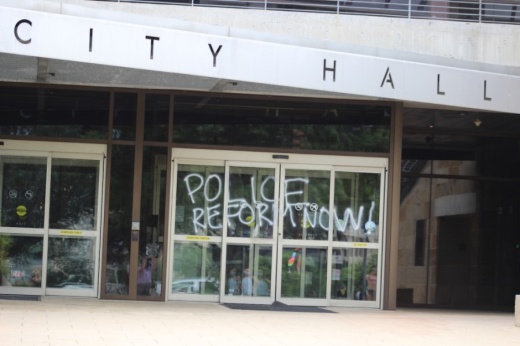With Austin City Council preparing to vote on the city’s fiscal year 2020-21 budget Aug. 12, one council member has offered a compromise proposal.
District 1 Council Member Natasha Harper-Madison has been among City Council’s most stringent supports of fundamentally reimagining how policing works in Austin. She has also expressed concern over making substantial decisions without proper vetting. Seeking a middle ground, Harper-Madison proposed City Council only authorize six months of police department funds.
The move, she said, was two-fold. It would allow more time for city staff to vet the various proposals—from restructuring to refinancing—made by council members, the community and experts. It would also require City Council, staff, the police department and the community to come back in March 2021 to face and vote on implementing the various proposals during what would be a mandatory mid-year budget session.
“This year’s accelerated budget process has left us with little time to do the work that is necessary to create lasting change in how our city addresses public safety,” Harper-Madison, City Council’s lone African-American representative, wrote on the City Council message board Aug. 4. “[My proposal] will ensure that [City Council] is in a position to vote on those items prior to or as part of a mid-year budget authorization in six months.”
Harper-Madison’s proposal would maintain the $11.3 million reduction to the police budget already proposed by City Manager Spencer Cronk through cutting 30 full-time officer positions and defunding the roughly 70 vacancies the department cannot reasonably fill next year.
Austin Mayor Steve Adler said the proposal “made sense” to him, admitting that he remains unsure about several of the police budget proposals made by City Council members. Although he acknowledged there are improvements the “community wants to see happening yesterday,” he is hard-pressed to support proposals that have not received proper vetting.
“I don’t know how best to give [Cronk’s team] the time to do that work without signaling to the community that we’re serious about getting this stuff done,” Adler said.
Last week, Cronk’s team, led by Deputy City Manager Nuria Rivera-Vandermyde, laid out its plans for reimagining public safety in Austin. The scope was wide, and the plan provided few definite dates and results. Adler pressed Cronk’s team to acknowledge the pressure from those in the community calling for immediate changes. Adler warned that taking too long could erode community trust.
Harper-Madison’s six-month proposal was welcomed by Austin Police Association President Ken Casaday. However, he said, ideally, such substantial changes to policing and public safety as those proposed by other City Council members would get punted for at least another year.
“I think out of everything I’ve heard so far come out of City Council’s mouth, this is probably the smartest thing,” Casaday said. “You can’t make major changes too quickly. If you’re trying to do the best for the city, the best for employees and the best for the community overall, these things take time.”
Casaday said to make significant changes to policing and public, the wider citizenry, not just activists, needed to be in on the conversations.
For months, local activist organizations have been mobilizing calls for dramatic cuts to the Austin police budget, between $100 million to $220 million, and reinvesting those dollars into public safety initiatives outside of policing, from mental health intervention to violence-prevention programs. Austin Justice Coalition, a criminal justice organization that has been at the forefront of local police debates in recent years, has called for a $100 million cut since June, with several City Council members supporting the effort.
The group’s executive director, Chas Moore, said he knows that substantial police reforms will take time but still wants to see City Council commit to significantly altering the public safety budget to spend less on policing and more on social programs that prevent harm.
“Obviously we have our sights on immediate cuts and transitions, and support the proposals that aligned with these goals,” Moore said via text. “There was discussion at [the July 28 City Council meeting] around this urgency and the benefits of these amendments and we hope there is more agreement between council members for [a] push for change now.”
Moore said some changes can be made immediately, such as expanding emergency medical services. He acknowledged there are other changes that will take more time but said this is a “both and” not an “either or” moment.
District 4 Council Member Greg Casar said he remains committed to reaching a $100 million reduction to the police budget by City Council’s scheduled Aug. 12 budget vote. Casar is among a few council members who have pushed specific proposals that would divert the $100 million away from the police department and into various public safety-focused programs. Casar said he supports Harper-Madison’s proposal to fund only the first six months of the police budget but believes it can happen alongside significant budget changes by next week.
“My sense is that we can do both,” Casar said. “I think the debate you’ll see next week will be around which things City Council members feel comfortable getting done in August and which things they think need more time.”
Citing the common practice of city staff to request deadline extensions, Mayor Pro Tem Delia Garza said she was "nervous" about the six-month timeline offered by Harper-Madison. Garza has supported what she called the "symbolism" of the demands to cut $100 million from the police department budget.





